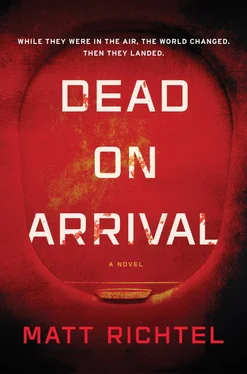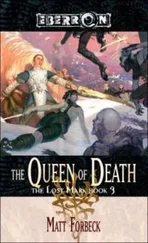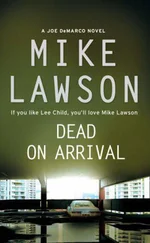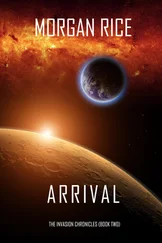“Look what the cat dragged in. Dr. Martin. Come in!” She pulled reading glasses from her nose and let them hang by the cord around her neck. “Ernie, hold my calls. Dr. Martin, can I get you a cup of coffee? Come in, come in.”
Once a world-class cyclist, Dr. Sanchez had grown sturdier and matronly. She sat behind a thick desk and offered him the chair across from her. She smiled. It was warm but affected.
“How are you?”
He nodded, fine, fine. “I know I’m barging in.”
“Not at all.” She could see he had something on his mind. She was accustomed to doctors with time pressure. “What’s up? What can I do for you?”
He smiled himself and touched his forehead with the folded pages of single-spaced names, signaling he wasn’t sure where to begin. He exhaled.
“I’m rusty,” he said.
She raised her hands as if to say: No problem. Shoot.
“Channelopathy.”
She laughed. “That’s the last thing I’d have ever guessed would come out of your mouth.”
He sat there, awkwardly. “It’s obviously not virulent.”
“Sorry?”
“You can’t catch it.”
She shook her head. No, of course not. She gave the standard doctor caveat that she wasn’t an expert. Some people, she said, were more susceptible than others, almost certainly on a genetic basis. She told him what he already knew about ion channels.
“What is its relationship to seizure?”
“If memory serves, they are distinctive but related. Some seizure disorders, epilepsy, are caused by channelopathy. Okay, my curiosity is piqued, Lyle. What’s up?”
Her voices carried all the harmonies and dissonance of her personality: genuine interest, intensity she tried to quiet, envy that she might be missing something or that Lyle could wind up discovering or getting something she might want, however unknown or irrelevant that thing might be to her.
“I was wondering if there are any signs that we’re seeing more of this. Any papers on growing incidence of electrical disorders?”
She thought about it and whether to take him at face value on such an unusual question. “Hmm.”
“Maybe related to your phone or all the electromagnetic fields from cellular technology.”
Now her eyes widened. It was true that there had been some talk about the potential for electromagnetic radiation, EMR, as a source of cancer. Nothing had been proven. It was more conspiracy chatter at this point than anything else. And she hadn’t heard anything regarding EMR and seizure. So her eyes were wide not from curiosity or recognition but from the thought maybe Lyle had revealed himself with a kind of desperation. From her standpoint, the proper order in this room had been established.
“Are there ways to prevent or short-circuit a seizure?” Lyle asked.
“Like phenobarbital?” Her eyes went wider now as she mentioned the barbiturate. Lyle knew that some of these drugs could be used to slow or prevent seizure but that wasn’t what he was asking. Of course, he wasn’t thinking he’d give everyone in the world a barbiturate, if that even would work. Now he was startled by what she must be thinking: he might be trying to get drugs. Or maybe she was going to make it look that way, to herself, even others.
“Is everything okay, Lyle?” she asked.
He gritted his teeth. She wasn’t going to make this easy. He felt the old irritations bubble; she was playing three-level chess—one level being gamesmanship—and he didn’t want any part of it. Fatigue overtook him.
“Anyhow, thanks for your time,” he said.
Outside, he couldn’t breathe. Forces he couldn’t name grappled for control of his body and brain. He leaned against a wall with paralysis, physical, emotional, spiritual. He knew what he needed to do. He knew what he had to do. A growling sound escaped his throat. A passerby moved inches away on the sidewalk. Lyle looked at his hands white with blood loss as he held furiously to the paper with the names. It took everything not to rip it to shreds.
He put it in his pocket. He pulled out his phone.
“Hello?”
“Hello, Melanie.”
“Lyle? I’m right in the middle—”
“Please.”
“Lyle, okay, hold on.” He could hear Melanie cup her hand over the phone. “I need five. Can you just take ice to the guy in 210?” She withdrew her hand from the phone. “Is everything okay?”
“No.” Lyle had moved himself to the backside of the building, opposite a parking structure. Were he paying attention, he could see the water and across the bay in the direction of Melanie.
“I’m in a room. I’ve got five minutes. What’s the matter, are you sick?”
“I’m sorry.”
“What?”
“Melanie, I’m sorry.”
“Sorry for—”
“Everything, all of it. It is on me.”
He heard first silence and then the sound of them crying for both of them. He invited the sound in. He closed his eyes. A minute passed.
“I love you, Mel. I will always love you.”
Sobs overcame her.
“I’m happy for you,” he said. “You have a beautiful family.”
“Thank you, Peño.”
At a café off the promenade, Lyle ignited his laptop. He pulled out the piece of paper with more than two hundred names. As the machine booted, he closed his eyes and listened to the memory of Melanie crying. He’d owed her an apology for more than three years. He probably owed her three years’ worth of apology. He owed it to himself too. At some point, whoever was to blame—him—no longer mattered. He felt the poison, the toxins, release from his body. He looked at the computer screen.
He typed the first name into Google.
Two hours later, two things were clear to Lyle. This was not a smart strategy. Second and more important: he was eager to keep going. The feeling reminded him of the old days, when no clock or skeptic deterred him. His idea had been to call up the names, look at current jobs and their pictures, which almost all of them had in some form or fashion. He’d hoped that one of them might trigger recognition. Or he’d see, or intuit, a pattern. Maybe one of them worked with Google cars. Had a Steamboat connection. Involvement with seizure research. Along those lines, there had been one former student, Dr. Mischa David, who worked at the Epilepsy Center at Mount Sinai Hospital in New York. Lyle spent a few minutes poking around about her and decided nothing else about her struck him.
Another woman, Jackie Badger, was unusual in that she had not followed a medical path and had, as far as he could tell, no further medical training. She worked at Google as an engineer. There had been no other information about her and the tiniest image. So he’d moved on.
Now he was only on the H’s.
He stood up and stretched. Walked outside and stared at people walking by. Most of them lost in their devices.
In the middle of a promenade stood a lone protester with a placard. It pictured a separatist with an automatic weapon. It read turncoat.
“Look up!” demanded the protester as he nearly got knocked into by a student reading his device. The student bounced off like a pinball and kept on. Lyle looked at the placard and the man holding the weapon. He had a memory flash that left him wobbling. A man with such a gun, shots fired, a body in a doorway. He clung to the image, tried to. It wavered, flickered. Shifted. A woman, standing with her phone. Clicking on it. Short hair, a hat. Flicker, flicker. Then again, two children in the backseat of a car.
Flicker. Gone.
He practically ran back to his laptop. He sat and clicked away. He called up the picture of Jackie Badger. He enlarged it. He held his breath. Dark hair, a light face. He cocked his head, tried her face on with different color hair, a hat, a worried look, a smile. He was sure he didn’t know her. Same as he didn’t feel like he’d known Eleanor when he met her at a café, but, on some level he did know her.
Читать дальше












